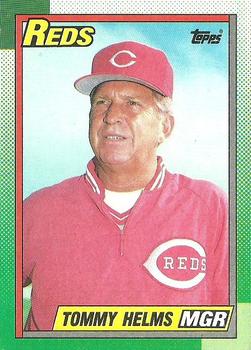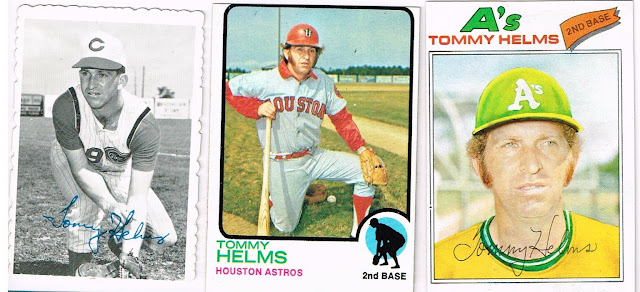Some
of the collections I have been working on over the years are starting
to get filled out and my goals are being reached. As a result, I'm
starting to slow down a little when it comes to acquiring many cards for
some of my mini-collections. Now that the collection is feeling more
and more complete, I wanted to start showcasing the cards I have, player
by player.
One
such collection is my Rookie of the Year collection. I love collecting
players who have won the award as the top newcomer in each league. This
wasn't born of hot rookie hype and the desire to prospect. Rather, I
became fascinated thinking about the careers of guys like Eric Karros,
Jerome Walton, and Tim Salmon, who experienced varying degrees of
success but may not have become superstars. I thought it would be fun to
have a collection that chronicles the individual career journeys of
rookie stars--whether they burned bright and flamed out quickly,
regressed to the mean, or wended their way to Cooperstown.
Tommy Helms
In 1964, Tommy Helms got his first cup of coffee, appearing in two games for the Reds after his call-up. The next season, he made 21 more appearances. In 1966, he was in the Big Leagues to stay as the Reds' primary 3rd baseman. During his first full season, he batted .284 and showed the most pop that he would show for his entire career: 9 HR and .380 slugging. His fielding percentage at the hot corner was .961, good for fourth in the Majors. It increased to .969 when considering his time at SS. Helms defeated Houston SS Sonny Jackson in the Rookie of the Year voting, gaining 60% of the votes.
The next year, in 1967, Cincinnati moved Helms to 2nd base. The move seemed to pay off, as Helms made the NL All-Star teams in two consecutive years, 1967-1968. Then in 1970-1971, Helms won the Gold glove at 2nd base. 1971 was his best season; he finished second in the MLB with a .990 fielding percentage and posted a 2.7 WAR. Following the season, Helms was sent to Houston as part of the trade that brought the legendary Joe Morgan to Cincinnati. Helms was the Astros' primary second bagger for the next three seasons, but by 1975--his fourth in Houston--he was settling into a part-time role. He spent 1976 in Pittsburgh after being traded for a player to be named later (Art Howe). After one season with the Pirates, he was traded to Oakland along with Phil Garner for six players, including Tony Armas, Doc Medich, and Dave Giusti. A year later he was released by the Pirates, signed with Red Sox, and his career came to after a year in Boston.
During his career, Helms was a slick fielder who finished in the top 10 in fielding percentage in eight of his nine seasons as a starter. He won two Gold Gloves and received two All-Star nods. His bat was somewhat weak, as he finished with a career OPS of .642. His career WAR was 8.6.

After his playing career, Helms entered coaching. He returned to Cincinnati and managed the Reds in place of the embattled Pete Rose for 64 games in 1988 and 1989. He won 12 of 27 in 1988 and 16 of 37 in 1989. He failed to obtain the full-time job in 1990, when the team won the World Series under skipper Lou Piniella.



The job Topps did on Tommy's 77T hat is so bad... it makes it a cool card. Anyways... I like the idea for this project. Can't wait to see which Walt Weiss cards you chose :D
ReplyDeleteI only knew him from his '69 Deckle Edge. I had no idea that he ended up being around for so long.
ReplyDelete